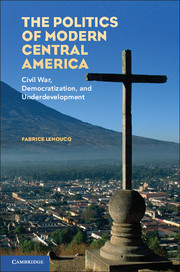Book contents
- Frontmatter
- Contents
- Figures
- Tables
- Introduction
- 1 Central America on the Eve of the 1980s
- 2 Civil War, Revolution, and Economic Collapse
- 3 Stalemates, Peace Negotiations, and Democratization
- 4 Economic Stability, Lackluster Growth, and Social Change
- 5 Democratization, State Capacity, and Redistribution
- Conclusion
- Bibliography
- Index
Introduction
Published online by Cambridge University Press: 05 September 2012
- Frontmatter
- Contents
- Figures
- Tables
- Introduction
- 1 Central America on the Eve of the 1980s
- 2 Civil War, Revolution, and Economic Collapse
- 3 Stalemates, Peace Negotiations, and Democratization
- 4 Economic Stability, Lackluster Growth, and Social Change
- 5 Democratization, State Capacity, and Redistribution
- Conclusion
- Bibliography
- Index
Summary
When I started graduate school in 1984, interest in Central America was at a post–World War II high. A region whose politics and economics generated little interest had become, by the late 1970s, an area making daily international headlines. A civil conflict in Nicaragua ended with the overthrow of President (and dictator) Anastasio Somoza in 1979. In neighboring El Salvador and Guatemala, left-wing guerrillas fought military regimes backed by the United States. A conservative administration in Washington led by Ronald Reagan interpreted these events as part of a Soviet and Cuban conspiracy to gain control of the isthmus, one that it chose to battle in what became the cold war’s last decade.
More than three decades later, these events seem both distant and surreal. Interest in Central America has evaporated. It seems odd, perhaps even bizarre in retrospect, that both the left and the right spilled so much blood about the horrors or benefits of political change and social revolution. I wonder how many of these protagonists would agree with former Nicaraguan Vice-President Sergio Ramírez (1985–90) that the Sandinistas should have reached a compromise with the Reagan administration to end the bloodshed (Kinzer, 2001b). The U.S. decision, one spearheaded by the Barack Obama administration, to support or at least not oppose the Arab Spring (2011–present) reminds us how the Cold War put us on the wrong side of political change in so much of the Third World. I also wonder what participants and observers from the 1980s would say if we could transport them to the present, one that has seen an eviscerated Sandinista movement led by an aging Daniel Ortega be reelected president in 2006, in part by colluding with his erstwhile opponents, and obtaining supreme court backing to run for consecutive reelection to the presidency in 2012, which he won by a landslide, with 62.5 percent of the vote.
- Type
- Chapter
- Information
- The Politics of Modern Central AmericaCivil War, Democratization, and Underdevelopment, pp. 1 - 10Publisher: Cambridge University PressPrint publication year: 2012



